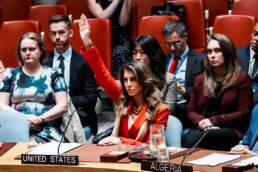المصادر:
(*) نُشرت هذه الدراسة في مجلة المستقبل العربي العدد 522 في آب/أغسطس 2022.
(**) جوني عاصي: أستاذ القانون العام والعلوم السياسية، جامعة النجاح، نابلس – فلسطين.
البريد الإلكتروني: john_aasi@yahoo.com
(***) مرسي عبد الرازق: باحث في القانون العام والعلوم السياسية، نابلس – فلسطين.
البريد الإلكتروني: mursisaleh9@gmail.com
[1] Relocation of the United States Embassy to Jerusalem (Palestine v. United States of America), Order of 15 November 2018, I.C.J. Reports 2018, p. 708.
[2] Michael G. Kearney, «Palestine, and the International Criminal Court: Asking the Right Question,» UCLA Human Rights and International Criminal Law Online Forum, 1 July 2010, <https://ssrn.com/abstract=1633975>.
[3] Pnina Sharvit Baruch, «A Palestinian State: Legal Implications and Significance for Israel,» Strategic Assessment, vol. 15, no. 4 (January 2013), pp. 53-67.
[4] ورد في: Gary Wilson, «Self-determination, Recognition and the Problem of Kosovo,» Netherlands International Law Review, vol. 56, no. 3 (December 2009), pp. 455-481.
[5] Antonio Cassesse, «The Israeli-PLO Agreements and Self-determination,» European Journal of International Law, vol. 4, no. 4 (January 1993), pp. 564-571.
[6] Eyal Benvenisti, «The Declaration of Principles 1993,» European Journal of International Law, vol. 4, no. 1 (1993), pp. 542-554.
[7] Legal consequences of the construction of a wall in the Occupied Palestinian Territory, ICJ, Reports of Judgments, Advisory Opinions and Orders, Advisory Opinion of 9 July 2004.
[8] Situation in the State of Palestine, ICC, Pre-Trial Chamber I, No. ICC-01/18, Date: 5 February 2021. (…) «the Chamber notes that the Palestinian right to self determination within the Occupied Palestinian Territory has been explicitly recognized by different bodies. The International Court of Justice observed that the «legitimate rights» of the Palestinian people referred to in the Israeli-Palestinian Interim Agreement «include the right to self-determination, as the General Assembly has moreover recognized on a number of occasions» and that certain measures adopted by Israel in areas of the West Bank «severely [impede] the exercise by the Palestinian people of its right to self-determination»». (para. 121).
[9] <https://ec.europa.eu/info/news/israel-joins-horizon-europe-research-and-innovation-programme-2021-dec-06_en>.
[10] Francis A. Boyle, Palestine, Palestinians and International Law (Atlanta, GA: Clarity Press, 2003), pp. 71-72.
[11] Letter of the State Department Legal Adviser, Mr. Herbert J. Hansell, concerning the legality of Israeli settlements in the Occupied Territories of 21 April 1978. For Mr. Hansell «Territory coming under the control of belligerent occupant does not thereby become its sovereign territory». «The governing rules are designed to permit the pursuit of its military needs by the occupying power, to protect the security of the occupying forces, to provide for orderly government, to protect the rights and interests of the inhabitants. and to reserve questions of territorial change and sovereignty to a later stage when the war is ended» p. 2.
[12] Monique Chemillier-Gendreau, «Jérusalem, le droit international comme source de solution,» Confluences Méditerranée, vol. 3, no. 86 (2013), p. 60.
[13] Henry Cattan, «The Status of Jerusalem under International Law and United Nations Resolutions,» Journal of Palestinian Studies, vol. 10, no. 3 (1981). p. 6.
قدّمت هذه الورقة إلى ندوة القدس التي عقدتها منظمة مؤتمر الدول الإسلامية في باريس في 1-2 كانون الأول/ديسمبر 1980.
[14] Yeshayahou Leibowitz, «L’avenir de Jérusalem,» Insistance, vol. 1, no. 1 (2005), pp. 219-222.
[15] Riktin Noviani and Garry Gumelar Pratama, «Legitimization of Jerusalem Embassy Act According to International Law,» Diponegoro Law Review, vol. 6, no. 1 (April 2021), p. 115.
[16] Lapidoth Ruth, «Jerusalem – Past, Present and Future/Jérusalem – Réflexions d’ordre juridique sur son passé, son présent et son futur,» Revue internationale de droit comparé, vol. 48 no. 1 (janvier-mars 1996), pp. 9-33: «When the fighting ended, Jordanian forces were in control of the eastern parts of the city, whereas the western sector was under Israeli control. In November of 1948 a truce came into force throughout the city, and at the beginning of 1949 an armistice agreement was concluded. This agreement gave rise to various practical as well as legal questions. The application of Israeli law to the western sector of Jerusalem was ensured by proclamations made by the Minister of Defence in 1948, and by the Area of Jurisdiction and Powers Ordinance of 1948. That ordinance provided that the law in force in the State of Israel should also apply to any part of Palestine which the Minister of Defence would designate by Proclamation to be under occupation of the Israeli Defence Forces» (p. 13).
[17] John Quigley, Sovereignty in Jerusalem,» The Catholic University of America, vol. 45, no. 3 (1996), p. 765, <http://scholarship.law.edu/lawreview/vol45/iss3/10>.
[18] John J. Mearsheimer and Stephen M. Walt, «The Israel Lobby and U.S Foreign Policy,» Middle East Policy, vol. 13, no. 3 (Fall 2006), p. 34.
[19] Ofer Aderet, «Silencing the Archive: A Ministerial Committee Censors Material on War Crimes in 48,» Haaretz, 8/10/2021 (in Hebrew).
[20] Adam Raz, «Four Years before the Six Day War in the General Staff They Admitted: In a Comfortable Political Situation We Can Hold on to the Occupied Territories,» Haaretz, 2/6/2021 (in Hebrew). «And to illustrate how direct the line was between the military administration that prevailed within Israel (until December 1966) and the one that existed in the territories, it is enough to look at the incarnation of its only official branches that operated the military administration in Israel from 1948 to 1966. In the months following the Six Day War, it became the «Department of Military Government and Spatial Security». Today it is known by another more catchy name» Coordinator of Government Operations in the Occupied Territories».
[21] Zachary Mollengarden and Noam Zamir, «The Monetary Gold Principle: Back to Basics,» The American Journal of International Law, vol. 115, no. 1 (2021), pp. 41-77.
[22] Pierre d’Argent, Symposium on Zachary Mollengarden and Noam Zamir, «“The Monetary Gold Principle: Back to Basics»: The Monetary Gold Principles: A Matter of Submissions,» American Journal of International Law, vol. 115 (2021), p. 150.
[23] Situation in the State of Palestine, ICC, Pre-Trial Chamber I, No. ICC-01/18, Date: 5 February 2021, parags. 59-60.
[24] Cattan, «The Status of Jerusalem under International Law and United Nations Resolutions».
[25] Legal Consequences for States of the Continued Presence of South Africa in Namibia (South West Africa) notwithstanding Security Council Resolution 276 (1970). ICJ Advisory Opinion of 21 June 1971. Reports of Judgments, Advisory Opinions and Orders.
[26] Shabatai Rosenne, «Capacity to litigate in the International Court of Justice: Reflections on Yugoslavia in the Court,» The British Year Book of International Law, vol. 80, no. 1 (2010), pp. 217-243.
[27] Sienho Yee, Towards an International Law of Co-progressiveness (Leiden; Boston, MA: Martinus Nijhoff Publishers, 2004), pp. 71-83. For the author, «the language in Article 35(2) granting control to the Security Council over the conditions under which a non-party to the Statute may become a party in a case before the ICJ needs to yield to the higher concern of resolving disputes involving jus cogens as soon as possible. As treaties may not override jus cogens, they should not hinder efforts to remedy violations of jus cogens. Accordingly, the phrase «treaties in force» should be given the broadest scope so as to facilitate any consenting sovereign State to utilise the ICJ to resolve any dispute involving jus cogens, without regard to whether or not the Security Council’s control applies. The first interpretation, that is, «treaties in force» means «treaties in force as of the date when the case is initiated, including those entering in force subsequent to the adoption of the Statute», achieves this purpose, and should be treated as a special interpretation applicable only in cases involving jus cogens» (p. 83).
[28] Patrick Daillier et Alain Pellet, Droit international public, 6ème ed. (Paris: Edition LGDJ, 1999), p. 515.
بدعمكم نستمر
إدعم مركز دراسات الوحدة العربية
ينتظر المركز من أصدقائه وقرائه ومحبِّيه في هذه المرحلة الوقوف إلى جانبه من خلال طلب منشوراته وتسديد ثمنها بالعملة الصعبة نقداً، أو حتى تقديم بعض التبرعات النقدية لتعزيز قدرته على الصمود والاستمرار في مسيرته العلمية والبحثية المستقلة والموضوعية والملتزمة بقضايا الأرض والإنسان في مختلف أرجاء الوطن العربي.



